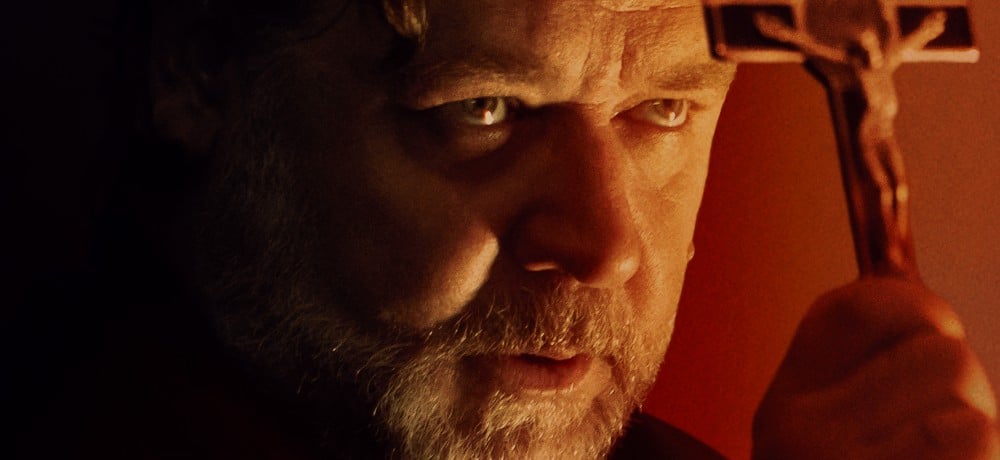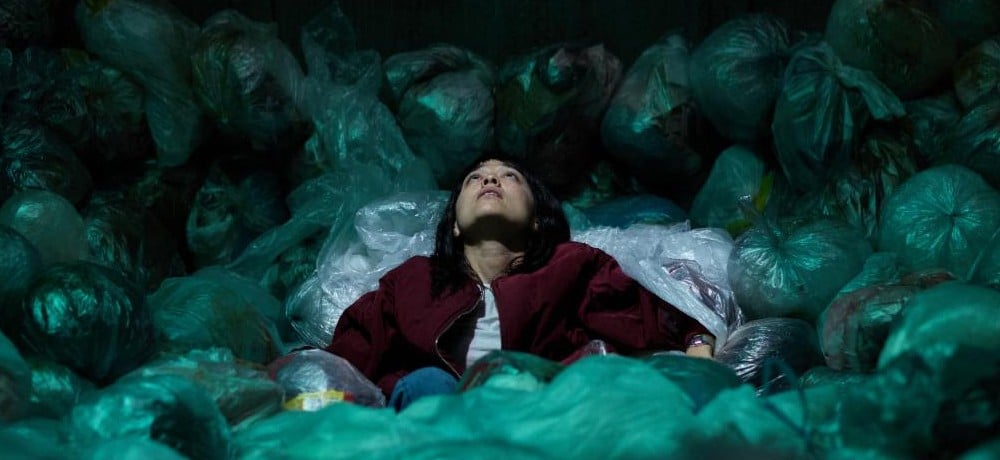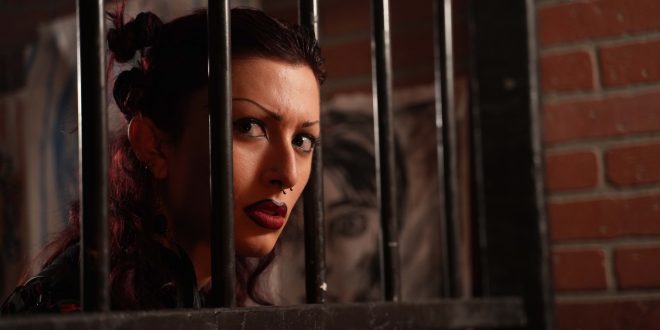Review: THE EXORCISM is Too Quiet On Set


It’s a shame that The Exorcism, co-written and directed by Joshua John Miller — the son of The Exorcist actor Jason Miller — is a sloppy and unsatisfying genre exhumation. Miller and co-author M.A. Fortin flaunted oodles of metatextual proficiency with their superb horror-comedy The Final Girls that are nowhere to be found in their sophomore feature. Miller’s direction chases New Nightmare and Scream 3 highs by seeking inspiration from supposed haunted productions like The Exorcist and Poltergeist, but behind-the-scenes perspectives are frequently and confusingly dropped like a hot potato. The Exorcism fails the prospect of a bible-verse-chanting exorcism on a horror film set, spiraling from mundanity into a third act that abandons conceptual intrigue for the most forgettable finale imaginable.
Russell Crowe stars as actor Anthony Miller, an ex-addict looking to turn his career around. The unfortunate death of his wife left him in a constant parade of inebriated TMZ appearances, but he’s reformed to be a better father to his daughter Lee (Ryan Simpkins). Anthony’s next audition is for a horror remake codenamed The Georgetown Project (The Exorcist takes place in Georgetown), for which he secures the leading priest role — after the previous actor presumably killed himself. Anthony’s childhood as an altar boy and his desire to atone for past transgressions make him the perfect choice, but the job’s stressors cause him to start drinking again. Lee worries about Anthony’s erratic drunken behavior, but as danger escalates, she begins to wonder if Anthony’s situation is worse than just another relapse.
What should be a scintillating blend of Hollywood urban legends and self-referential horror creativity is disappointingly silly. The Exorcism doesn’t have the juice to see its premise through beyond the numbered shoot day title cards that chronicle Anthony’s worsening condition. The whole point of how he’s suffering from demonic possession while filming an exorcism flick based on an all-time classic is too juicy, yet Miller barely wrings a few drops of excitement into an almost still-empty cup. When Anthony initially walks onto a sound stage with a three-story camera-ready house already constructed, it’s such a unique immersion into backlot culture that teases an excellent idea for where an exorcism should take place — but that’s all Miller musters: teases.
Exorcism mythos are masked by Anthony’s alcoholism at first, which is a flimsy in-universe excuse due to the apparent severity of his milky-eyed antics. Crowe wanders around his bachelor apartment or into the hallway for a naked piss, keeping Anthony ominous and in the shadows. As Lee interrogates her father, finding him bloodied or spitting vile threats in “Demon Voice,” she turns to the shoot’s hired authenticator and psychiatrist, Father Conor (David Hyde Pierce) — who rejects her initial fears. It’s all very boilerplate, with the speculation about chaos erupting on set keeping us hopeful. Tragically, the film never goes full The Cleansing Hour or Late Night with the Devil. After Anthony inhumanly contorts before the onlooking crew, The Exorcism foolishly ditches its larger ensemble, envisioning a closed-set ceremony with an antithetical conclusion that’s the opposite of saving someone by driving a demon from their body.
In a matter of words, Miller and Fortin take the easy way out. Anthony’s written as a broken man with repressed trauma from an abusive religious past that becomes the motivation for his role — and an invitation for Satan? It’s never clear why Anthony’s possessed; it simply happens. Adam Goldberg’s director stereotype utters despicable motivational triggers to Anthony, fueling his rage by unlocking suppressed memories, which seems to be enough for demonic intervention. The problem becomes the lack of supernaturality that occurs on-set, and how the exorcism engages (or doesn’t) with surrounding PAs, actors, or other professionals. Lee’s stuck babysitting Anthony as Crowe reenacts exorcism movie tropes throughout the subgenre’s canon, except when Anthony’s used as a slasher villain for two wholly confusing and clashing asides. What’s posed as this ingenious reinvention of the exorcism genre is merely smoke and mirrors — the result is achingly uninspired.
Performances aren’t horrendous, as Crowe and Simpkins fight for their characters’ wholesome struggling-father-slash-rebel-daughter relationship. Pierce’s gaunt figure as a white-collared clergyman fulfills his role with a typical sense of wry charms and stoic gazes. Sam Worthington pops up as a forget-he’s-here supporting actor, while Chloe Bailey leaves an impression as Lee’s more-than-a-friend crush. The cast is fighting for their lives to make The Exorcism more appealing than its generic as hell title, but Miller’s inability to sustain momentum or tighten continuity squanders each performance.
The Exorcism is deceptively unremarkable — a movie that abandons its core competencies two-thirds into this blasphemously nonsensical mess. Miller and Fortin’s cutesy allusions to The Exorcist are a kiss of death, drawing unwarranted comparisons without relevant payoffs. Whatever’s executed exceedingly well has been done before (Anthony’s elasticity body-bending special effects), which makes the absence of follow-through on original seedlings all the more detrimental when they never blossom. What a seismic waste of potential.
Movie Score: 2/5




